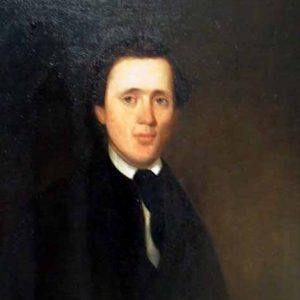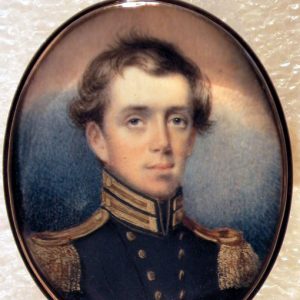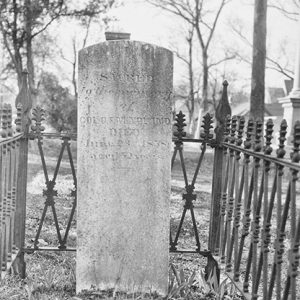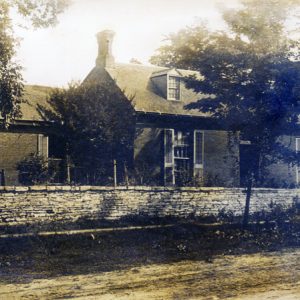calsfoundation@cals.org
Fent Noland (1810–1858)
aka: Charles Fenton Mercer (Fent) Noland
One of Arkansas’s most famous citizens during the antebellum period was Charles Fenton Mercer (Fent) Noland, a Batesville (Independence County) lawyer. He became a national figure as one of the leading “Southwestern humorists” with the regular publication of his letters in the New York Spirit of the Times, the leading national sports and humor newspaper. Noland was Arkansas’s representative in the literary movement named for the “old Southwest” (Alabama, Mississippi, Louisiana, and Arkansas), which delighted the nation with an array of bucolic frontier/agrarian writings.
Fent Noland was named for Charles Fenton Mercer, the family friend who founded Aldie, Virginia, where he was born on August 23, 1810, the fourth of the five children of William and Catherine (Callender) Noland. His father was a plantation owner who spent much of his life in public service as a delegate in the Virginia legislature, a federal land receiver in Arkansas, and a commissioner of public buildings in Washington DC.
Noland grew up in a large extended family that included the Berkeleys after his sister Frances married Lewis Berkeley, who operated the Noland plantation, which later became the Berkeley plantation. Noland’s regard for Berkeley led him later to name his own son after him, as well as a new town on the Black River—a failed investment. Noland attempted a military career, but his dismissal from West Point in 1825 took him to Batesville (Independence County), where he read law under James Woodson Bates. He became a lawyer and entered into Arkansas politics, but after he killed Governor John Pope’s nephew in a duel that originated with Noland’s criticism of the governor, he left the territory in another failed attempt at a military career. Angry at having been passed over for promotion, he left the Army, and after other possible careers failed to develop, Noland returned to Arkansas politics in 1836 as a member of the constitutional convention; he was chosen to carry the new state constitution to Washington.
In 1840, he married Lucretia Ringgold, daughter of leading Batesville merchant and Whig politician John Ringgold. They lived in the Ringgold house until 1855, when they moved to Little Rock (Pulaski County) for him to pursue other vocational paths, including swamp commissioner and newspaper editor.
Noland’s first letter was published in the Spirit of the Times in 1836. He began as a reporter of horse races and other sporting events, and those themes became focused in his fictional character “Pete Whetstone,” who spun yarns about Arkansas hunting, politics, and life in general. His national audience grew, and Noland found himself a national celebrity. Although he provided the original first-person format for his humorous letters, copied by later writers, he never republished his Spirit letters and thus never received any financial gain or long-term fame for his writings.
As a politician, Noland was a passionate speaker and writer. In his early years, he was a Democrat, but he became a leading Arkansas Whig. After the notoriety of his early duel, he never fought another, but his fights in support of Whig candidates, such as William Henry Harrison, and causes, such as riverine improvements, were continued in the newspapers and the General Assembly.
Hampered for years by poor health, he finally succumbed (to tuberculosis, possibly) in Little Rock on June 23, 1858. He was buried in Little Rock’s Mount Holly Cemetery, which also contains the graves of his wife, who later married James Keatts, and son, Lewis Berkeley Noland, who survived the Civil War but died childless in 1870.
For additional information:
Cash, John David. “Fent Noland, Thomas Bangs Thorpe, and Friedrich Gerstaecker: Positive Images of Frontier Arkansas.” Arkansas Review: A Journal of Delta Studies 51 (April 2020): 3–10.
Justus, James H. Fetching the Old Southwest: Humorous Writing from Longstreet to Twain. Columbia: University of Missouri Press, 2004.
Lankford, George E. “Fent Noland: The Early Years.” Arkansas Historical Quarterly 64 (Spring 2005): 27–47.
———. “Fent Noland Among the Cherokees—Maybe.” Independence County Chronicle 42 (April/July 2001): 16–22.
———. “Fent Noland and the Cherokee Diary: A Final Note.” Independence County Chronicle 44 (July 2004): 35–37.
———. “Fent Noland Was Not Among the Cherokees.” Independence County Chronicle 43 (October 2001/January 2002): 35–41.
———. “A Road Not Taken: Fent Noland and Sam Houston.” Independence County Chronicle 46 (July 2005): 33–48.
Noland, C. F. M. Cavorting on the Devil’s Fork: The Pete Whetstone Letters of C. F. M. Noland. Edited by Leonard Williams. Fayetteville: University of Arkansas Press, 2006.
White, Lonnie J. “The Pope-Noland Duel of 1831: An Original Letter of C. F. M. Noland to His Father.” Arkansas Historical Quarterly 22 (Summer 1963):119–23.
Worley, Ted. R. “An Early Arkansas Sportsman: C. F. M. Noland.” Arkansas Historical Quarterly 11 (Spring 1952): 25–39.
George E. Lankford
Batesville, Arkansas









Comments
No comments on this entry yet.